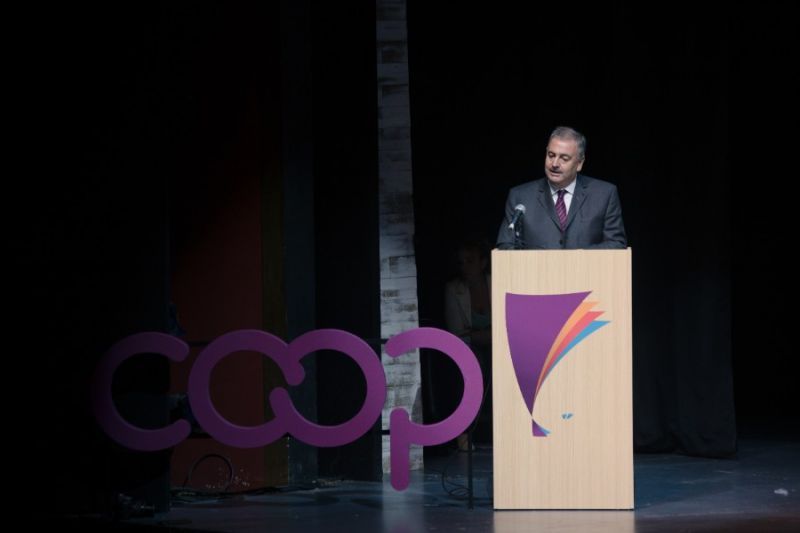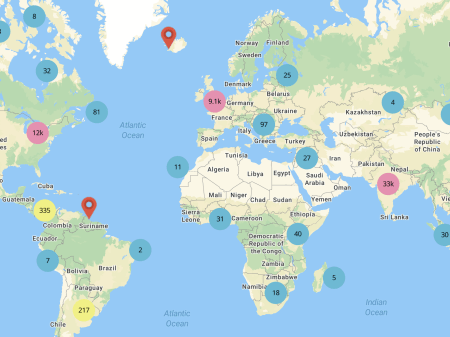
"The way we produce and consume has to change. To do this we need to return to making every territory's actual economy its centre of gravity. And that's where we are as cooperatives. From each territory, we can and must build a global economy that can protect us all. One that responds to the needs, aspirations, and projects of each and every community."
These were the opening words of the President of the International Cooperative Alliance (ICA) Ariel Guarco, at the 5th Cooperative Summit of the Americas on Tuesday 23 October. The event took place over a week in Buenos Aires, with 1500 leaders and representatives from across the world coming together from different continents to celebrate the ICA's annual assembly.
"A different global economy is possible. An economy created and built from the territories. We can offer our business model to do it, where we democratically - as workers, consumers, savers, and producers from every territory - organise ourselves to respond to the needs of our communities. A different global economy is possible if we focus our efforts on local sustainable development", he stressed. Read more information on his opening speech here
Graciela Fernández, the new President of Cooperativas de las Américas (Cooperatives of the Americas) gave the summit's opening lecture. "The continent is suffering from the dismemberment of our institutions and regional bodies. Cooperativism speaks another language. We need to build shared capabilities", she said. Watch the full video of her speech here.
The close on Friday 26 saw a return to the theme of the 5th Summit's three pillars: protecting the planet, a financial system at the service of sustainable development, and the integration of a social and solidarity-based economy. Our civilisation is once again facing the risk of collapse thanks to limitless competition in the use of natural resources", she said.
"Humanity needs to once again put its trust in international cooperation to secure peace and sustainable development. And cooperativism must be a key player in this process, just as it was in the process of reconstruction following the world wars", she remarked.
"Our communities feel defenceless against economic globalisation, hegemonized by concentrated financial capital that has no commitment to our territories". She also made a special mention of the advancement of women in managerial roles within the cooperative movement, and asked for a deepening of the dialogue between this and the women's rights movement.
All the activities planned as part of the 5th Summit centred around three key pillars: protecting the planet; building a financial system for sustainable development; and the integration of a social and solidarity-based economy to confront global challenges. Lectures on the first theme were led by FAO representative Eve Crowley, and German documentary filmmaker Valentin Thurn. Both place a high value on the role of a solidarity-based economy in food production, protecting the environment, and democratising the producer-consumer cycle.
In the next session there was a talk from Ecuadorian economist Pedro Páez, who warned that a new cycle of debt was lurking in the region. He said: "There will be money for speculation and war, not for the development of the people".
Next, Argentinian theologian and philosopher Eloy Mealla talked about ethics in politics, the economy, and the financial system. "Now the time has come for politics and the economy to put themselves at the service of living", he said. Finally, he made reference to certain commonalities between the cooperative doctrine and the social doctrine of the Catholic Church.
In the final session, a representative from the Fondo Internacional de Desarrollo Agrícola (FIDA) (International Fund for Agricultural Development) Marco Marzano de Marinis commented; "Agricultural cooperatives produce 50% of everything we need to feed ourselves": a successful model, he said, "that should be replicated at a global level" with a view to achieving the Sustainable Development Goals.
Talking about the integration of a solidarity-based economy, Juan Antonio Pedreño, President of Social Economy Europe, told how on this continent the sector brings together 232 million members and 14 countries: all of whom see it as a priority. On this same theme President of the Congreso de Mondragón (Mondragón Congress) Javier Goienetxea presented the main challenges faced by Basque cooperativism, and explained how the creation of tools and funds for inter-cooperation makes a difference to the cooperative group, and allows them to put their trust in sustainable development. More information here
During the various events at the summit there were activities on farming production, consumption, associated working, public services, communication, finance, insurance, youth, gender equality, law, education, housing, public policies, and cooperative social responsibility.
Download the final declaration, all the news, and photos from the 5th Cooperative Summit of the Americas here




